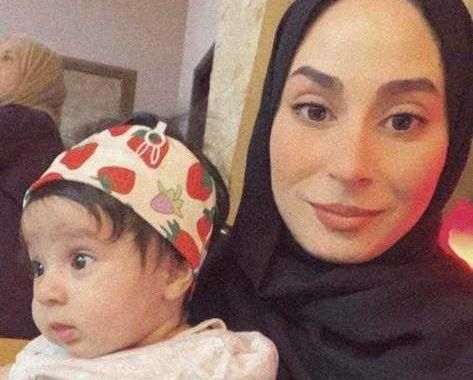Remembering a vibrant artist and mother killed in Gaza, Baraa Abu Mohsen
Killed by an Israeli bomb on the family home in Gaza, Baraa left behind broken hearts and a seven-month-old daughter.

Al-Fukhari, Gaza – For Rawaa Abu Mohsen, it was the life that her sister Baraa led that she wants to remember, not how she died on October 30.
Baraa, 31, was killed along with their mother in an Israeli bombing.
Keep reading
list of 3 itemsRemembering Issa al-Souri, a little boy killed when Israel bombed a church
Remembering Ahmed, aspiring dentist and dreamer
“My mother was Baraa’s closest friend,” Rawaa recalled of the bond they shared.
Of course, she added, like any mother and daughter they would fight over trivial things, but such things quickly passed.
For Rawaa, “Baraa was my sister, my companion, and partner in my happiest memories. She would always ask me to go to her house with my daughter, so we could stay up and talk”.
Finding her passion
At school, Baraa had struggled with formal education, her sister recalled, preferring to express herself through the endless drawings that covered her textbooks and homework.
Nevertheless, she did well at school, eventually gaining the grades needed to enter university and study English.
At first, she had hoped to work for an international organisation but in the end, her creativity took hold, leading to her establishing her own business, designing and making the tiny models that decorate the surface of cakes.
It was a talent that Baraa discovered almost by accident.

“She was browsing the internet,” when she stumbled across the idea of miniatures, Rawaa said. Soon, she “started working on them, despite not having the necessary tools to produce quality products”.
Baraa could not find the paste she needed to make these miniatures, for example, so she had to make it herself out of common household ingredients and paint it by hand.
Loving the work she was doing and feeling creatively fulfilled, Baraa soon met a man she fell in love with and married.
To her delight, she was soon pregnant and welcomed her beloved daughter, Tamara, with open arms.
Tamara was Baraa’s world, Rawaa remembered. When they were together, they did not need the world, they lived lives of their own, separate from whatever surrounded them.
Building a future, only to have it stolen
But cracks soon started to appear in Baraa’s marriage and she moved back in with her parents, all the while exploring ways to expand her business, so it would provide for her and Tamara, and their future.
She managed to secure funding from an NGO and had started work on a diploma in project management when war broke out.

“She was always thinking about how she could be strong and continue to live her own life,” Rawaa recalled, “She didn’t care about anything except her daughter.”
The day Baraa and her mother were killed is fixed in Rawaa’s memory.
“We were talking the night before,” she said, “She was telling me how Tamara [now seven months old] was afraid of the bombing and would cry because of the noise.
“She asked me to bring my own children to the family home because the house and neighbourhood were safer than ours.”
Ironically, the family home would be bombed the following day.
“I never thought that this would happen to my family,” Rawaa said, adding that she had been told everyone was fine when the attack first happened.
Later, she found out that both her sister and mother were among those seriously injured.
Rawaa was able to visit her, but Baraa’s condition remained unstable.
“She woke up, but didn’t eat anything. On her last day, she asked to eat bread, zaatar, oil, olives and pickles,” Rawaa remembered.
The last thing her sister asked for before she lost consciousness for the final time was to see her daughter, so she could breastfeed her.
Baraa died not long afterwards, passing along with her mother.
Her last wish: to hold her child.